Enab Baladi | Ali Darwish
A few meters separate the two territories controlled by opposition de facto authorities in northern Syria. These are the Syrian Salvation Government and the Syrian Interim Government, which set up distinct systems of the judiciary, and adopted different sources of legislation and methods for the enforcement of court rulings.
The Syrian Interim Government predominates in Afrin regions, north of Aleppo, northern countryside of Aleppo, and the areas of Tell Abiad, north of Raqqa, and Ras al-Ayn, northwest of al-Hasakah. The Salvation Government, however, rules in Idlib and a part of the western countryside of Aleppo.
The Deir Ballout and Ghazwiyeh internal crossings do not only split up these areas geographically; they also demarcate the judicial spaces of the two governments, and the borders of court rulings’ effects.
Through these crossings, wanted persons and convicts can escape from the areas of the Interim Government to the Salvation’s, or in the opposite direction. They evade prosecution, unless a new suit is filed against them with the courts on the other side.
The Turkey-backed Syrian National Army (SNA) is considered the military wing of the Interim Government, operating under its affiliated Ministry of Defense, in addition to the military and the civil police, which function under the Ministry of Interior.
The Salvation Government, for its part, is accused of being a political and administrative facade for the Hayat Tahrir al-Sham (HTS), which the latter dismisses as mere disinformation, stressing that it operates in the area in coordination with the government.
In both areas, it happens that the residents take matters into their own hands, resolving disputes without referring to courts. The armed groups themselves have repeatedly stopped clashes by holding meetings of armed groups’ commanders and dignitaries. At the end of such meetings, the parties often lay down terms for “reconciliation.”
In the territories in question, judicial employees’ lives are always at stake, given the security chaos and recurrent assassinations and explosions that have claimed the lives of people from different social and professional backgrounds.
In this investigation, Enab Baladi outlines the structure of the judiciary system and explores the sources of legislation in the opposition-held areas, as well as the obstacles hampering the development of the judiciary as an institution.
Enab Baladi also examines the working mechanisms of lawyers and the major challenges they encounter.
For the purposes of this investigation, Enab Baladi has interviewed citizens affected by the discrepancies in the judicial approaches in the two areas, judges, lawyers, and officials from the two governments.
Armed groups and security services going solo:
Where is the judiciary?
On 12 October 2020, Ahmad Wahab, a 25-year-old policeman, took too long to come home from his work at the Bab City Police Station, north of Aleppo.
Hours passed and Ahmad still did not show up. His father called the station and was told that Ahmad has been arrested for stealing a hard disk drive of one of the Police Station’s computers.
Ahmad spent 19 days in detention. On 1 November 2020, the family was informed that he was taken to the hospital due to kidney failure.
A Disciplinary Board was formed by the al-Rai Police Station, north of Aleppo, to hold a trial.
The board was founded to interrogate Lieutenant Abdullah al-Nayef. Ahmad pressed charges against al-Nayef for his brutal behavior and for subjecting him to torture while in custody, the thing that caused his kidney failure.
Ahmad was acquitted of the theft charges after his family hired a lawyer and the Director of the al-Bab Police Department, Sergeant Khalid al-Ahmad, promised to oversee the case and hold accountable the persons involved, each according to their offenses.
The story of Hussam Hamadah, a singer of Islamic devotional songs, ended just like Ahmad’s, and was similarly violent.
Hussam was subjected to beating by the personnel of the Military Police, affiliated with the Turkey-backed SNA, in Afrin city.
Hussam was detained for hours. “Because he did not show enough respect to the master, [Director of the Police Department Muhammad Hamadin],” a number of policemen hit Hussam and spared him no insults, Hussam recounted to Enab Baladi.
People played the intermediary between Hussam and the Military Police. The talks resulted in the dismissal of five policemen who participated in beating Hussam. They were sent to prison and brought before the court. The director of the police department also apologized and was reported to the Grievance Committee of the SNA, the Afrin-based Interdepartmental Committee for Restitution said in a statement on 7 November 2020.
In the territories of the Salvation Government, the General Security Service, operating in Idlib, has often taken the task of prosecuting people wanted for security reasons.
Even though the HTS Public Relations Office denied having ties with the General Security Service, the group has arrested several persons, including media activist Nour al-Shilo, the American journalist Bilal Abdul Kareem, and the British aid worker Tauqir Sharif.
The HTS released media activist Nour al-Shilo, on 4 January, having detained her in its affiliated prisons for three months.
Over the course of al-Shilo’s detention, activists were sounding the alarm that the HTS has passed a death sentence against al-Shilo and is intending to execute her on the charge of “providing information to the International Coalition” led by the U.S. against the Islamic State (IS).
The HTS did not provide any details of the court proceedings, which sentenced the activist to death.
The American Journalist, Darrell Lamont Phelps, nicknamed Bilal Abdul Kareem, has been detained by the HTS since 14 August 2020.
At the time, the HTS said it has arrested Phelps because he was associated with many allegations. But the arrest was carried out a few hours after Phelps posed the following question on his private platform On the Ground News: “Is torture allowed in HTS prisons?”
The British aid worker Tauqir Sharif was luckier than his friend Phelps. The HTS released Sharif on 25 November 2020, three and a half months after his second arrest. Sharif was pardoned after he signed a pledge not to resume the activities he was charged with, “funding projects that incite division.”
The residents of Idlib took to the street to protest the HTS practices after the group’s personnel killed two civilians from the Ghanoum family at a checkpoint on 8 November 2020.
The HTS Public Relations Office made a statement regarding the said incident.
The evening the two civilians were killed, a complaint was made to the HTS personnel that there was something strange happening in the place; the personnel started searching the area, the office reported.
It was late dark hour when the personnel observed two young men riding a motorcycle in the reported area. The personnel were alerted and had to stop the suspects, HTS spokesman, Taqi al-Din Omar, told Enab Baladi online.
The personnel ordered the riders to stop, but they tried to flee. The situation grew more suspicious. The riders’ death was “wrongful, not deliberate. The personnel intended to stop them only,” al-Omar added.
The court proceeded to establish that the death was wrongful, not deliberate. The parents of the murdered riders also were summoned. They were to choose either blood money for quasi-intentional killing, diyah mughallazah, or to forgive the personnel, al-Omar said.
The parents demanded that the case be brought before a judge of their choice and that they will adhere to any ruling he renders, al-Omar added.
The selected judge reassessed the case’s details and the former court ruling. He validated and ratified the ruling. But the parents once again protested and took to the media. Some parties exploited the incident to fuel tension and called for protests in Idlib city, al-Omar said.
In Idlib, court proceedings are set up by the ministries of justice and interior, affiliated with the Salvation Government, because the ministries are relevant judicial institutions, al-Omar stated.
Idlib-based activities, however, said that the HTS has coerced the killed riders’ families into accepting the court ruling.
The arrest and death incidents reported above indicate a set of general practices across rural Aleppo and Idlib. These include private prisons and arbitrary arrests, documented by local and international rights organizations.
Interim and Salvation: no judicial coordination
The Minister of Justice of the Interim Government, Abdullah Abdul Salam, said that neither cooperation nor communication is held with the Salvation Government.
Plaintiffs can file suits against any persons involved in offenses across the areas administrated by the Interim Government. A judgment in absentia is then rendered against the fugitive defendant, who has escaped to the areas run by the Salvation Government; by the regime; or by the Syrian Democratic Forces (SDF) in northeastern Syria, Minister Abdul Salam added.
The prosecution of fugitives is a matter of international political settlements. Today, such international entities cannot be approached, Minister Abdul Salam told Enab Baladi.
Enab Baladi attempted to contact the justice ministry of the Interim government, sending a request for questions to the Public Relations Office on 3 January. However, no response has been received yet.
Courts in the territories of the Salvation and the Interim governments were founded as a response to the “exigencies” of the absent regime institutions, including the judiciary; the people’s need for a body to oversee and lay judgments regarding their renewed cases and disputes; and the people’s wish to achieve some sort of social, economic, and financial stability, as well as build peace, judge and legal researcher Abdulrazaq al-Hussain told Enab Baladi.
These needs and goals “are largely dependent on these courts’ ability to respond to the people’s needs and resolve their problems, which remains a difficult thing to achieve,” judge al-Hussain added.
The courts operated by the two governments are different in various regards, including political and legal terms of reference, and given the absent role of the constitution.
In the territories of the Salvation Government, courts drive their powers from the government and reinforce “uncodified Islamic Shari’a rulings.” Their working mechanism and rulings are based on a “large number” of circulars issued by the justice minister, judge al-Hussain said.
In the territories of the Interim Government, courts function without any reference to the relevant government institutions. “The Interim Government in fact does not practice any real supervision over the courts’ work,” which have been founded and continue to operate under the administration and supervision of the Turkish authorities and the armed groups they back. These courts consider the Syrian laws, which do not contradict the objectives of the revolution, applicable. They have even adopted a judicial structure similar to the regime’s.
Two associations going by the same name:
The lawyers’ divide
In the territories held by the Interim and the Salvation governments, two separate lawyer associations are run, which share the same name: The Free Lawyers Association (FLA).
There are no relations between the FLA, operating in the Interim government’s areas, and the FLA operating in the salvation government’s areas in Idlib. There is no coordination between the two associations, as well, President of the Aleppo branch of the FLA, Hassan al-Moussa, told Enab Baladi.
The Aleppo FLA’s organizational regulations are not applied in Idlib “because the government of Abu Mohammad al-Julani, [HTS commander], holds reins to the FLA exclusively; and the sharia scholars are part of the judicial institution, who also dominate the FLA branch,” al-Moussa added.
In the Interim Government areas, the FLA organizes its activities and law practice by the Syrian Law No. 30 of 2010, passed to regulate the work of the Syrian Bar Association. The FLA has nullified articles that contradict its independence as an association, by deleting those related to establishing the sovereignty of the Ba’ath Party and the Syrian authorities over the association’s work, al-Moussa told Enab Baladi.
Law No. 30 is supplemented by articles of the Syria Civil Code that regulate the rights and obligations of lawyers and their clients. The fees, however, are governed by the Law Profession Regulation Act and are monitored by the branch’s council through fee claims.
Nearly 650 male and female lawyers are members of the Aleppo-based FLA.
Enab Baladi reached out to several lawyers in Idlib, requesting their comment on several issues related to the FLA, but they have all apologized for various reasons. Some said they were not practicing law in the meantime; others said that they quit because the HTS intervened in the formation of the association.
Lawyers are working within acceptable limits. The power of attorney that governs lawyer-client relations are issued by the Idlib-FLA, and the wages are left for the lawyer and the client to determine. Should any disputes arise during the legal process, the lawyer and client refer to the FLA for a resolution, but no laws are adopted to regulate the lawyers’ working mechanisms or to be used as a source of reference, lawyer Mahmoud al-Fadil told Enab Baladi.
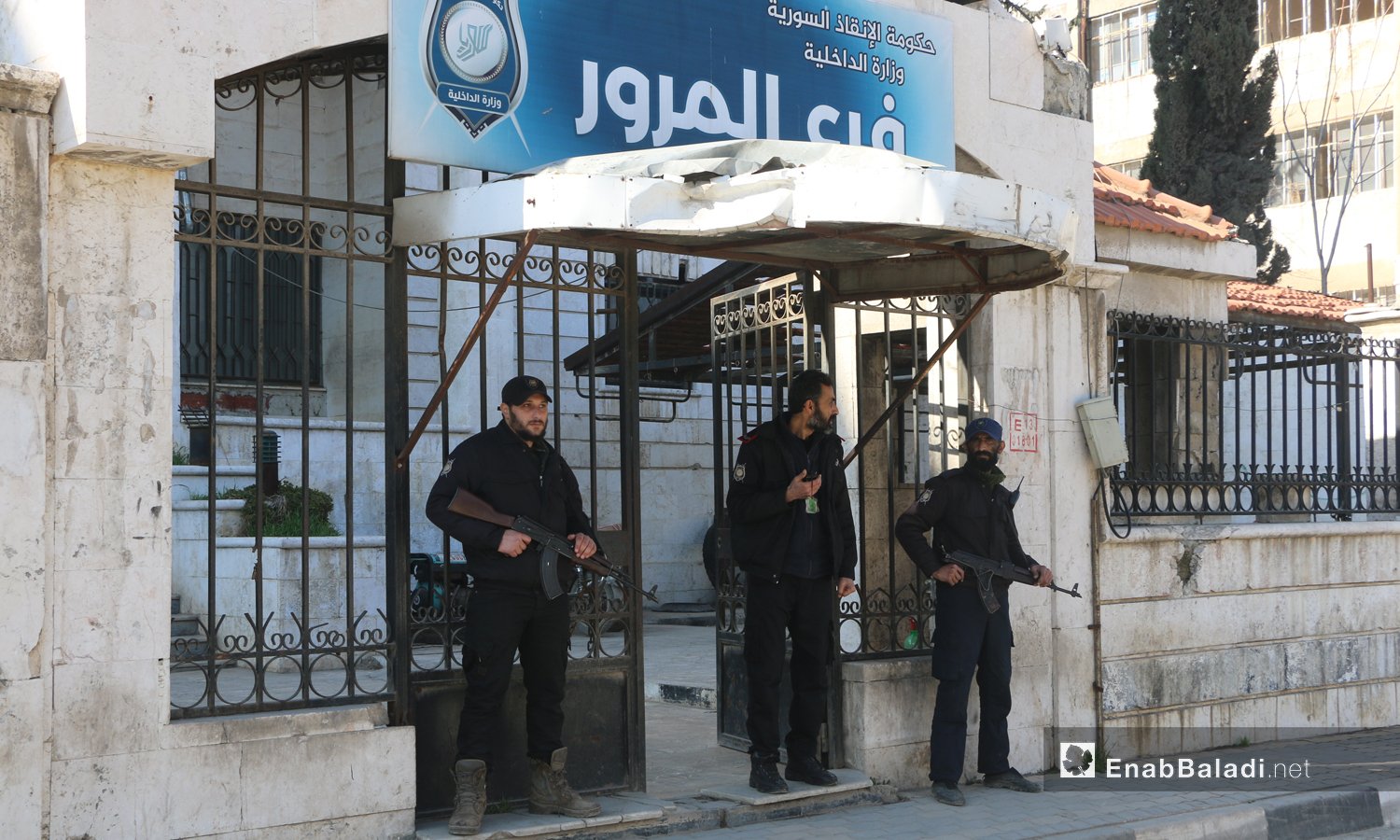
Traffic Police Department, affiliated with the Ministry of Interior of the Salvation Government — 6 February 20121 (Enab Baladi/Anass al-Khouli)
| The FLA was founded during a conference held on 11 June 2014 in Gaziantep city, south of Turkey.
Initially, the FLA encompassed 75 lawyers, representing 5000 Syrian lawyers inside the country; those disbarred by the regime’s Bar Association; and others who left Syria for their anti-regime opinions. |
Judicial structure:
2017 year of separation
In the territories of the Interim Government, the judicial structure developed gradually, the Minister of Justice, Abdullah Abd al-Salam, told Enab Baladi.
Judicial bodies consisting of jurists—dissident judges and lawyers, as well as Sharia scholars— were formed in the areas controlled by the opposition in late 2012. These bodies remained operative up to May 2017.
At the time, the judiciary was formed in cooperation with Turkey, because the Ministry of Justice of the Interim Government was not established yet. Legal professionals were assigned the judicial work.
It was agreed to apply the provisions of the Syrian laws with reference to the 1950 Constitution. That is adopting the Syrian Judicial Authority Law in the formation of courts— courts of first instance, investigation judges, public prosecutors, courts of appeal, the court of cassation— and the organization of the judiciary’s work in line with international regulations and rules, as well as the Syrian law.
The 1950 Constitution was the first to be drafted after Syria acquired its independence from France; it was the first constitution to include a clear text on the sources of legislation, and also the first constitution to contain separate texts on the state’s religion and the sources of legislation, according to a study by Omran Strategic Studies.
In Chapter V, the 1950 Constitution states that the judiciary is independent, and defines the mechanisms for appointing, transferring, and promoting judges, as well as rendering rulings, and courts that administer justice, among other matters.
Minister Abdul Salam emphasized that the judicial institution is “independent, and there is no authority over the judges’ work, who are supervised only by the Court of Cassation,” which is the ultimate authority to resort to should any court ruling be appealed.
In the Interim Government territories, there has been coordination with Turkey regarding the judicial process. The Judicial Inspection Department in the “liberated” areas is administering the process, “without interfering in the judges’ work or the decisions that the judicial body hands down,” Minister Abdul Salam added.
The Interim Government is currently seeking to form a judicial council to “optimize” the work of the judicial institution, he added.
The Ministry of Justice holds regular meetings with representatives of the FLA in Turkey, particularly representatives of the southern states.
In December 2020, the Minister of Justice, Abdullah Abdul Salam, and members of the FLA met with a representative of the Lawyers Association in the border city of Kilis.
The two parties discussed “the status of courts, the role of the Ministry of Justice and lawyers in the liberated north, and the difficulties facing the judicial work and lawyers,” as reported by the official website of the Interim Government.
The territories controlled by the Interim Government were divided into three judicial areas: Azaz, north of Aleppo and near the Syrian-Turkish borders; Afrin; and Tell Abiad.
In every judicial area, there is a Court of Appeal, and sub-courts, established in central and densely populated areas. The courts are operated by 73 judges.
The Syrian Interim Government established the Higher Judicial Institute, where judges are provided with skills necessary for their work, following a scientific plan. However, the Ministry of Justice is waiting for donors to start investing in this project.

The Minister of Justice of the Syrian Interim Government and members of the Aleppo-based Free Lawyers Association (FLA)—28 June 2020 (Ministry of Justice/Facebook)
Who controls the military?
Violations and military courts in Aleppo
In the countryside of Aleppo, the violations committed by militants operating within the ranks of the armed groups that merged under the SNA remain the most complex issue to address. The situation there calls for the improvement of the performance and powers of the military courts.
The Military Justice System constitutes an administration covering areas in Tell Abiad and Ras al-Ayn (Operation Peace Spring territories); the northeastern countryside of Aleppo (Operation Euphrates Shield territories); and Afrin (Operation Olive Branch territories).
The military courts in the countryside of Aleppo apply the Syrian Penal Code of 1949; the Military Penal Code of 1950; the Criminal Procedure Code; and other Syrian criminal laws, Director of the Military Judicial Department, Brigadier General Arafat Hammoud, told Enab Baladi.
In the areas of the Interim Government, the military judiciary shares the Court of Cassation with the criminal judiciary, with an appointed advisor at the Military Criminal Chamber.
The Court of Cassation is tasked with overseeing other courts, monitoring mistakes should they occur and correcting these mistakes.
The rulings rendered by the military courts in Azaz and Tell Abiad are reported to the Military Prosecutors and to Single-Judge Courts in the remaining areas when the ruling is stated as irrevocable. Then, the ruling is implemented by the SNA-affiliated Military Police, which has eight branches in the countryside of Aleppo, Brigadier General Arafat Hammoud said. The military judiciary derives its support chiefly from the SNA, and there is “great response” from the army’s commanders.
The army’s three corps (the first, second, and third) have contributed to suppressing violations in several locations and to controlling “terrorist” cells and handing them over to the Military Police, Brigadier General Hammoud added.
What judiciary governs judges’ work?
The judicial system enforced in the Interim Government’s areas is the Syrian judicial system regulated by the Judicial Authority Law promulgated by Decree No. 98 of 1961, Attorney General of Azaz Court, Yasser al-Basha, told Enab Baladi.
Under the decree, the Authority Law guarantees the judges’ rights to immunity from dismissal and transfer, to judicial vacation, and to professional independence over the course of their work.
“Judges are almost 100% independent, particularly since militants are now being tried before the military court,” Attorney General al-Basha added.
The judiciary applies the Syrian Criminal Procedure Code, which regulates the prosecution, arrest, and detention of criminals authorized by a legal warrant, as well as bringing them before the criminal courts, which hold public hearings that ensure the accused persons’ rights to defense.
When the court hands down a not-guilty verdict, the accused is acquitted and released, when the court renders a guilty verdict with the appropriate prison sentence, the case documents are referred to the Public Prosecution Office again, which then enforces the sentence against the convicted person.
25 courts and judicial departments controlled by Salvation Government
In 2017, the Syrian Salvation Government was founded. Later, the ministries of interior and justice were established. The two ministries operate dozens of police stations and courts that oversee a significant number of cases, adopting a series of measures and procedures.
The judicial institutions, including courts, administration departments, and police stations are headed by “a group of Syrian elites and academics,” HTS spokesperson, Taqi al-Din Omar, told Enab Baladi.
“In Idlib, persons, who are brought before the court due to criminal or misdemeanor personal claims, or for posing a threat to public security such as cells affiliated with the regime or the Islamic State, go through the regular judicial procedures: searches, investigations, confessions, gathering evidence, witnesses and others,” Taqi al-Din said.
According to HTS spokesperson, the Ministry of Justice in the Salvation Government has the full power to oversee the cases brought before it through the judges and courts affiliated with it.
In the territories run by the Salvation Government, the number of courts and judicial departments amounted to 25, with various judicial specializations, including military, civil, criminal, and administrative courts, former Minister of Justice, Ibrahim Shasho, said.
The Judicial Inspection Units were established to address grievances, Minister Shasho said during the October 2019 graduation party of the first batch of judges, enlisted at the Higher Judicial Institute.
Developing the judiciary:
Awaiting a comprehensive solution
A constant state of instability grips the opposition-controlled areas, for the Syrian regime regularly threatens to wage military operation there. This has increased the armed groups’ influence, which goes beyond military activities, to all fields of administration.
In the said areas, the challenges that legal professionals encounter include an extent of chaos and cumulative effects of malpractices, which predate the formation of the judiciary system, military and ordinary. Citizens also have grown accustomed to dispute and problem resolving mechanisms that mostly do not adhere to the law or the workings of organized institutions, Brigadier General Arfat Hammoud said.
Other difficulties belong to the early stages of the formation of the judicial system in these areas. Only a few judges defected from the Syrian regime’s departments back then, the reason why the judiciary departments had to hire experienced lawyers, who managed to perform judiciary duties since the beginning of the revolution, Minister of Justice of the Interim Government, Abdullah Abdul Salam, said.
In the opposition-held areas, lawyers must be better qualified for the judicial work and their skills sharpened, Minister Abdul Salam added.
Minister Abdul Salam mentioned other challenges, keeping judges safe and the scarce salaries they receive, attributing the low pay to the little resources that the Interim Government has.
There is no “procedural code” to separate judges’ from the lawyers’ work in the areas controlled by the Salvation Government, according to Idlib-based Mahmoud al-Fadil, considering that most of the judges there are inexperienced, whether those working in the civil courts or in the military ones.
However, the performance is improving given the expertise gained by legal professionals over past years, and because lawyers were engaging in the judicial system, he added.
The courts in opposition areas are trying to develop their work under difficult conditions—there is no constitutional source of reference; there are different opinions on which laws to enforces; the administrative and political terms of reference are ambiguous, not to mention that there is no umbrella judicial council, judge and legal researcher Abdulrazaq al-Hussain said.
There is also the hegemonic role assumed by the armed groups, which “practically have no central authority. This is diminishing the courts’ already weak role, and is, accordingly, making it difficult to achieve their chief goal, which is bringing justice to people.”
Courts in opposition areas are “temporary per se” because their presence depends on the general situation in the country, continuing to function only as long as an ultimate solution is not reached in Syria, judge Al-Hussein added.
It is most likely that the judiciary will continue with the same methods and approaches without significant development. But when a final solution to the Syrian issue is reached, through a comprehensive political change that reunites the country, these courts will “no more exist.” Only by then, it would be possible to talk about a Syrian judicial institution, established according to the unity of the State and the Syrian people, according to judge Al-Hussein added.
Among the difficulties facing lawyers are displacement and their clients’ loss of documents, particularly in the cases of marriage registration and establishing lineage. There is also the loss of real estate records in some areas, such as Afrin and al-Bab, which affects the course of the legal process, especially in cases of seizures and sale transactions.
Moreover, the lack of procedural coordination between the Courts of First Instance; the Court of Cassation; and the Court of Appeal is exhausting clients and lawyers and prolonging the process, not to mention that so far it has been difficult to provide lawyer associations with suitable offices within the courts, President of the Aleppo branch of the FLA, Hassan al-Moussa, said.
Local attempts at improvement
The Interim and the Salvation governments have independently established institutes to develop the work of the judiciary.
The Ministry of Justice of the Interim government is still waiting for the doners to operate the Higher Judicial Institute.
Every now and then, the ministry attempts to hire news judges to provide the military judiciary with the expertise and competencies needed to cover the work that continues to increase with the horizontal expansion.
Regular meetings are also held with the judges to guide them and to identify errors, and find mechanisms to avoid such errors, in addition to training court clerks and executives, said Brigadier General Arafat Hammoud.
There are several criteria that a judge must meet to be accredited by the Interim Government. He must hold a law degree; have previous experience in judicial work as a lawyer; and successfully pass the interview, in addition to being from a “revolutionary background or at least one that is pro-revolution” according to Brigadier General Hammoud.
Judiciary development is relative, given the collapse of the infrastructure caused by the Syrian regime’s bombing, Attorney General of Azaz Court, Yasser al-Basha said.
In Idlib, in October 2019, the first graduating batch of the Judicial Institute, operated by the Salvation Government, amounted to 25 judges. The institute admits only applicants who have a degree in law or Sharia.
The institute provides a two-year training (one year of theoretical instruction; a second applied). The graduates’ work is supervised and evaluated by the Judicial Council of the Salvation Government, according to the government’s News Agency of Sham.
Lawyers and judges at gunpoint
Brigadier General Arafat Hammoud said that all military justice departments have military police stations, which control security; organize the plaintiffs’ and clients’ entry into these departments; and provide protection for judges.
Nevertheless, the opposition-held areas witnessed several assassinations and attacks against judges and lawyers. In the latest of these incidents, former Minister of Justice of the Salvation Government, Ibrahim Shasho, survived a guided shooting on 4 January.
In April 2020, the Salvation Government mourned the death of Judge Ali Ezzdin Radwan, who was killed by an explosive device.
Unidentified persons assassinated the Head of the Lawyers Syndicate in the city of Al-Bab, Said Anwar al-Ragheb, on 22 March 2020. The assailants detonated an explosive device they planted in the al-Ragheb’s car.
On 19 October 2020, the Azaz Military Court Judge, Melhem Melhem, died from wounds he sustained as an explosive device detonated in his car.
if you think the article contain wrong information or you have additional details Send Correction
النسخة العربية من المقال
-
Follow us :












 The building of the Ministry of Interior of the Syrian Salvation Government — 6 February 2021 (Edited by Enab Baladi)
The building of the Ministry of Interior of the Syrian Salvation Government — 6 February 2021 (Edited by Enab Baladi)





 A
A
A
A
A
A


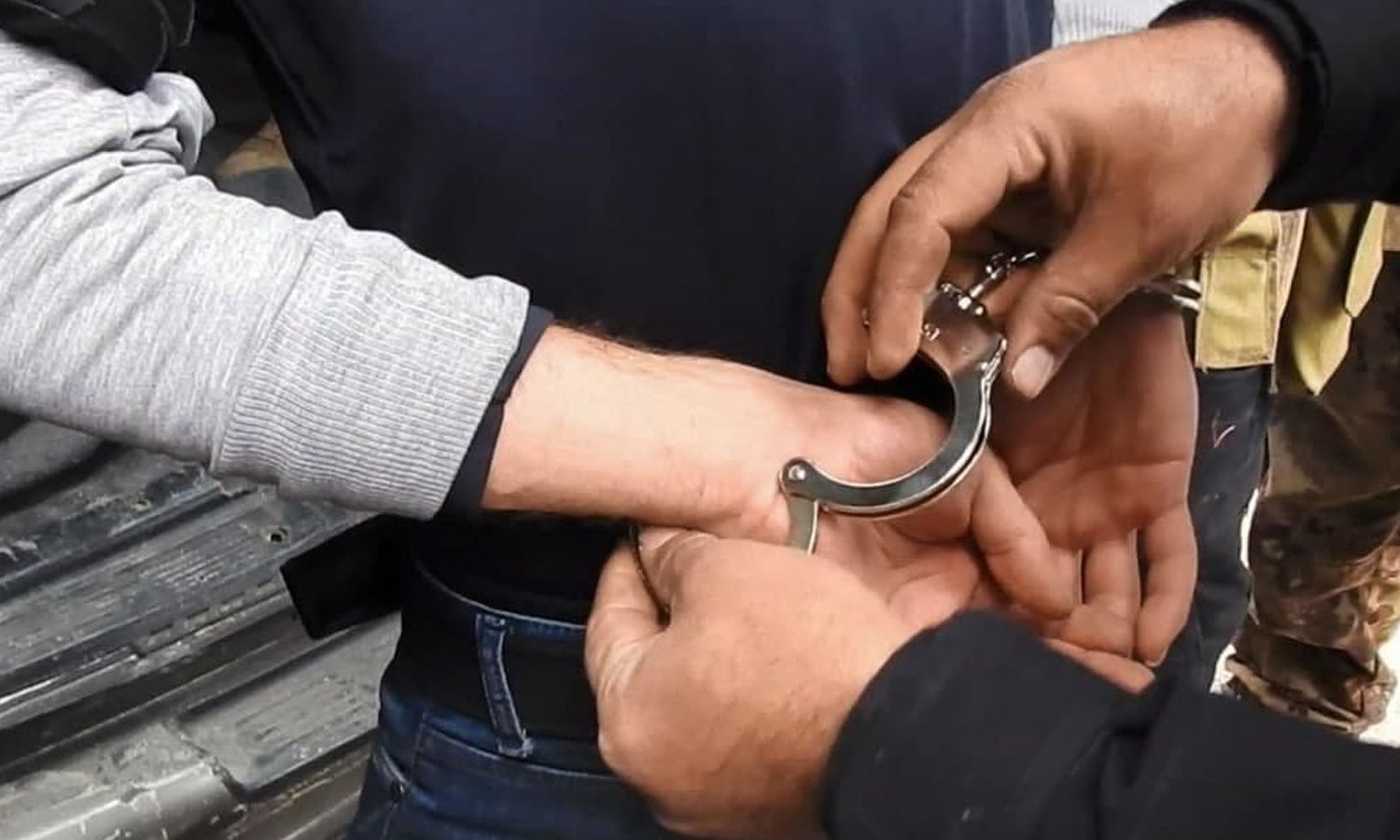
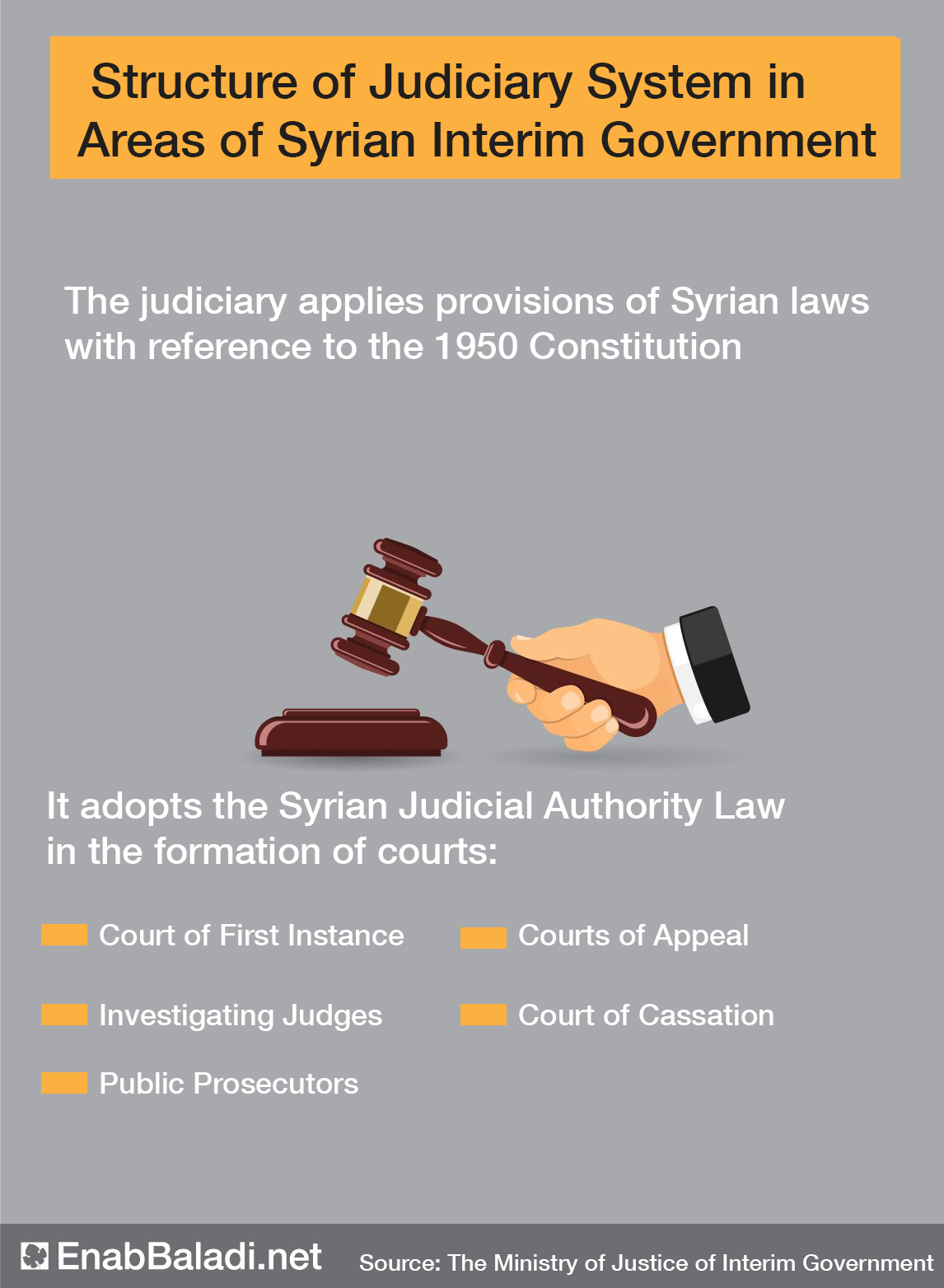
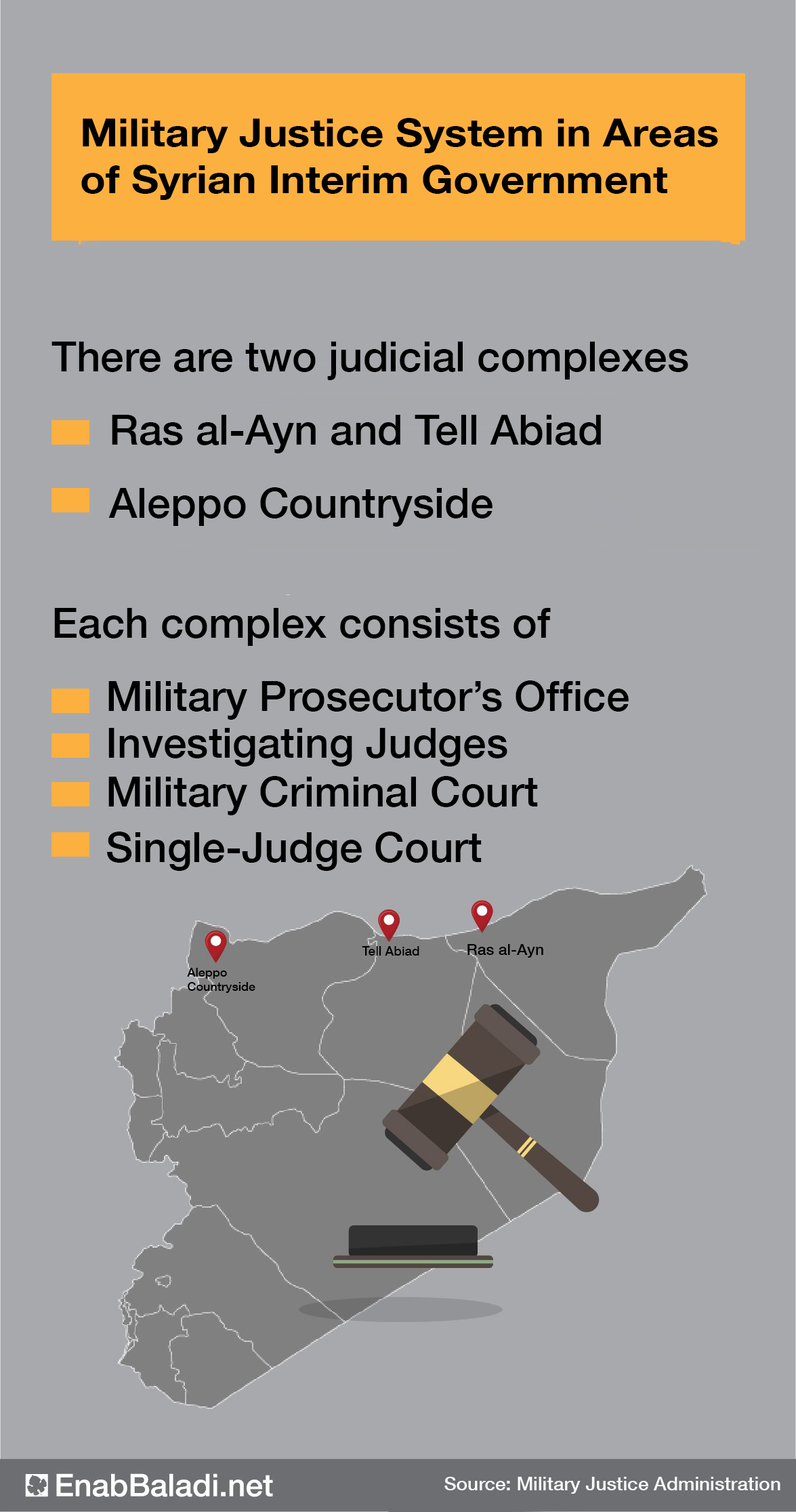
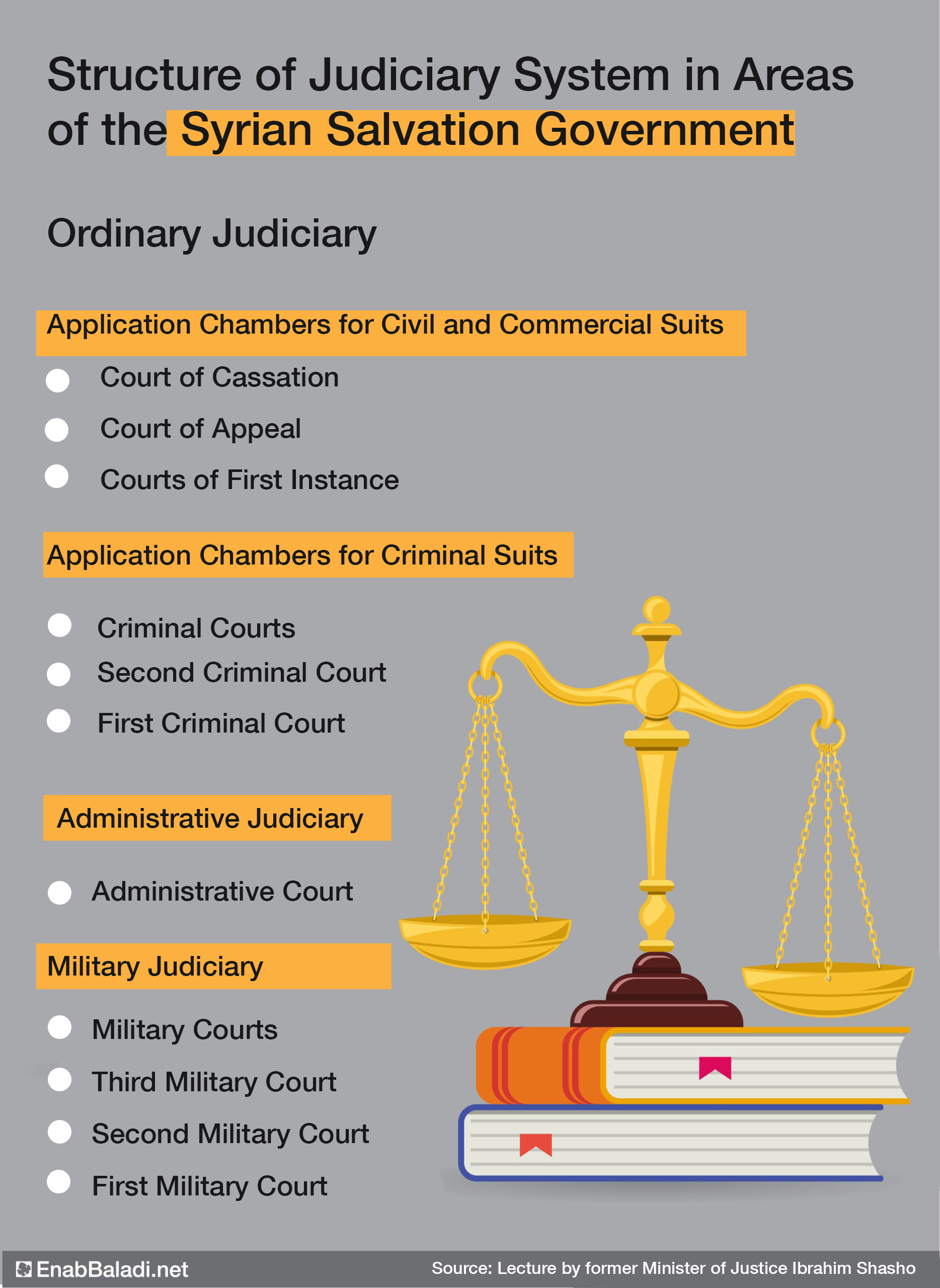
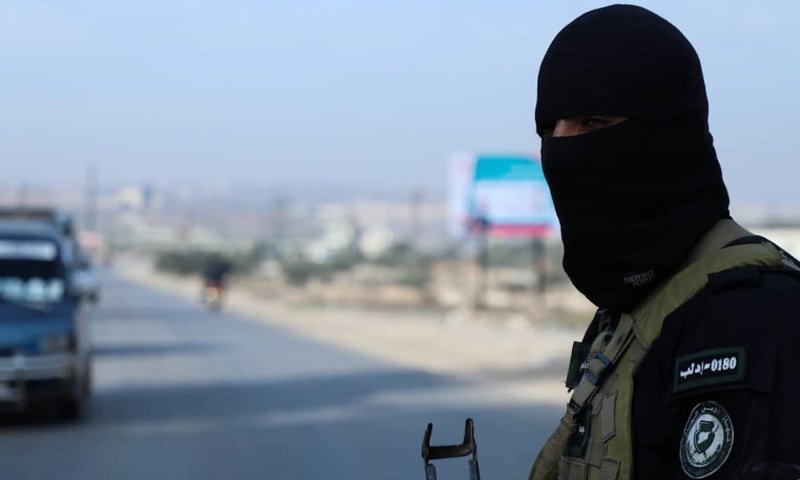







 More In-Depth
More In-Depth